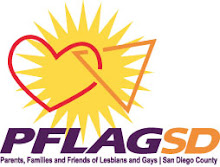A CHANCE TO BLOOM by Tawney Collins-Feay
Remarks presented at Safe School Coalition Press Conference November 14, 1996
I am the proud mother of three sons, ages 10, 15, and 21. They're all
musical and right handed, of course they're all wonderful—and my eldest son
is gay. Reading the Safe Schools report brought back to me an article I read
in the newspaper several years ago about a mother who had lost her teenage
son to suicide. He was a popular, high-achieving, seemingly well adjusted boy
who had everything going for him. Out of the clear blue, it appeared, he shot
himself. No note. No one who knew him could come up with an explanation.
I knew I could not possibly fathom this mother's anguish. Her precious
child, gone forever, and she would never, never know why.
Psychologists tell us that losing a child is the worst pain that humans can
endure; losing a grown or nearly grown child is the worst of the worst. I
didn't need a psychologist to tell me that; I had a teenage son very nearly
the same age as the one in the article. I could bitterly imagine what that
mother must be going through and my heart ached for her.
We will never know what caused that child to lose all hope—that child who
had the love of family and friends, who seemingly had it all. But I did know
something that I could not ignore, nor wish away: the awful statistic that
haunts all of us who know it: gay and lesbian teens are four times more
likely to attempt suicide than their straight peers.
What if that were the truth of that young man's story? What if he felt
that he was living a lie—that those around him loved him only because they
didn't know the truth about him—and if they did, they would despise him? Hate
him?
That is the truth of too many children's stories. Their bright, hopeful,
innocent faces become clouded with anxiety and fear as they start to realize
the names so casually bandied about in conversation: "dyke," "queer,"
"fag;"—and the mocking jokes—apply to them. What if someone finds out?
Every single one of us knows what it is to feel put down, criticized,
mocked, for just being the way we are. Even if only for a moment—it seems to
be part of the ritual of childhood. The difference for our gay children is
that this is an officially sanctioned cruelty; not from every pulpit but
from too many, not from every loved and respected adult in the child's life,
but from too many—not in every classroom nor on every playground, but too
many—and we see the hopeful innocence fade, sometimes all the way to a self
hatred that is as fatal as it is inevitable. It is simply not possible to
live in a world where even God, you are told, hates you, and survive without
severe damage to your sense of self.
And let us make no mistake about it: many children know, from the time they
are very young, that they are "different." By the teen years, the hate
messages, repeated over and over, have become so ingrained that many children
simply cannot go on.
I cannot stop thinking about that young man, and so many thousands like him.
It is so unnecessary that this should have happened! It is simply ignorance
and fear that keeps good people saying bad things, never thinking that they
might be saying them about their own loved ones.
If every family knew, as a matter of course, that the children born to them
might be gay, and that being gay is not a "lifestyle choice," how much
different would the lives of all children be?
Because bigotry doesn't just hurt gay people. How would my two straight sons
feel if something happened to their brother? What message would my husband
and I have sent to them if we had kicked our son out of the house when he
came out to us? "I'll love you as long as you fit into the expected picture
I have of you." Love just doesn't get any more conditional than that.
We at PFLAG know that our children are fine just the way they are. We know
that young children have to be taught to hate. Given the chance, they can
learn to love. We affirm today that every child deserves to know the truth:
that everyone is worthy of respect, that "different" does not automatically
mean "wrong," that growing up and learning in an atmosphere of dignity and
safety is our birthright. That none of us is free when any are oppressed.
We need to ensure that these freedoms are protected for all our children. I
think of the words of Adrienne Rich—not exact, but a paraphrase:
Can you simultaneously say to your child?
"Bloom, my flower,
shine, my star," and,
"You are hated, being what you are."
For the sake of ALL the children who are looking to us with their bright,
hopeful faces, we MUST make sure that each one has a chance to bloom.




No comments:
Post a Comment
Thank you for your comments.